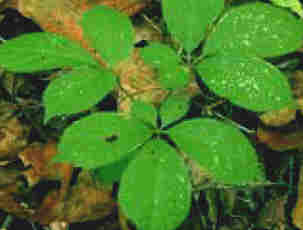
Plant Description
Caution & Interaction

Latin (botanical) name:
Eleutherococcus senticosus
Common names: Siberian Ginseng
Plant Description: Siberian Ginseng is part of the Aralia family, as is the more commonly known Red Chinese Ginseng. It is found in Siberia, northern China, and parts of Japan. It can grow as tall as six feet at maturity. Siberian Ginseng grows in the wild and has a relatively large root system. The roots are the coveted part of the plant, as they contain the active compounds, called eleutherosides. These eleutherosides include long chain sugars, known as glycosides, which have tonic properties to the metabolic system.
Medicinal Properties &Uses: Siberian ginseng is an adaptogen, although perhaps more mild than Korean ginseng. Because the root has a human-like shape, it is considered by Asians to be an overall body tonic. This herb supports energy and helps to balance the body. Numerous clinical studies have demonstrated its ability to increase capacity for mental and physical work, decrease recovery time from work and injury, and decrease the influence of environmental stimuli. In Chinese medicine, it was used to prevent respiratory infections and to provide energy. The active constituents of Siberian Ginseng are the eleutherides. For patients going through chemotherapy or radiotherapy, the eleutherides in Siberian Ginseng would be very useful. In Cancer therapy, the immune defenses are weakened and Siberian Ginseng offers a better tolerance to such treatments. Siberian Ginseng contains remarkable compounds that favorably affect the adrenal glands. By supporting healthy adrenal gland function, Siberian Ginseng helps the body to adapt to stress. Studies have shown that it boosts the body's capacity to handle physical stresses ranging from heat exposure to extreme exertion. That's why many athletes use it as a supplement. Siberian Ginseng has also been shown to be useful in preventing female infertility as it supports healthy uterine function. Animals studies indicate that Siberian Ginseng boosts testosterone levels, which could help reverse certain cases of male impotence, as well as increase sperm count.
Dosage: 15-30 drops in water or juice, 2-3 times daily, or as needed.
Cautions & Interactions: Keep out of reach of children.
Efficacy Studies & Other Clinical Data:
Disclaimer (U.S. Only): These statements have not been evaluated by the FDA. These products are not intended to diagnose, cure, treat, or prevent any disease.
Common names: Siberian Ginseng
Plant Description: Siberian Ginseng is part of the Aralia family, as is the more commonly known Red Chinese Ginseng. It is found in Siberia, northern China, and parts of Japan. It can grow as tall as six feet at maturity. Siberian Ginseng grows in the wild and has a relatively large root system. The roots are the coveted part of the plant, as they contain the active compounds, called eleutherosides. These eleutherosides include long chain sugars, known as glycosides, which have tonic properties to the metabolic system.
Medicinal Properties &Uses: Siberian ginseng is an adaptogen, although perhaps more mild than Korean ginseng. Because the root has a human-like shape, it is considered by Asians to be an overall body tonic. This herb supports energy and helps to balance the body. Numerous clinical studies have demonstrated its ability to increase capacity for mental and physical work, decrease recovery time from work and injury, and decrease the influence of environmental stimuli. In Chinese medicine, it was used to prevent respiratory infections and to provide energy. The active constituents of Siberian Ginseng are the eleutherides. For patients going through chemotherapy or radiotherapy, the eleutherides in Siberian Ginseng would be very useful. In Cancer therapy, the immune defenses are weakened and Siberian Ginseng offers a better tolerance to such treatments. Siberian Ginseng contains remarkable compounds that favorably affect the adrenal glands. By supporting healthy adrenal gland function, Siberian Ginseng helps the body to adapt to stress. Studies have shown that it boosts the body's capacity to handle physical stresses ranging from heat exposure to extreme exertion. That's why many athletes use it as a supplement. Siberian Ginseng has also been shown to be useful in preventing female infertility as it supports healthy uterine function. Animals studies indicate that Siberian Ginseng boosts testosterone levels, which could help reverse certain cases of male impotence, as well as increase sperm count.
Dosage: 15-30 drops in water or juice, 2-3 times daily, or as needed.
Cautions & Interactions: Keep out of reach of children.
Efficacy Studies & Other Clinical Data:
-
Project Aware - Remedies for Menopausal Symptoms Include Siberian Ginseng
- Virtual Health Info - Exploring Herbs & Supplements
Disclaimer (U.S. Only): These statements have not been evaluated by the FDA. These products are not intended to diagnose, cure, treat, or prevent any disease.